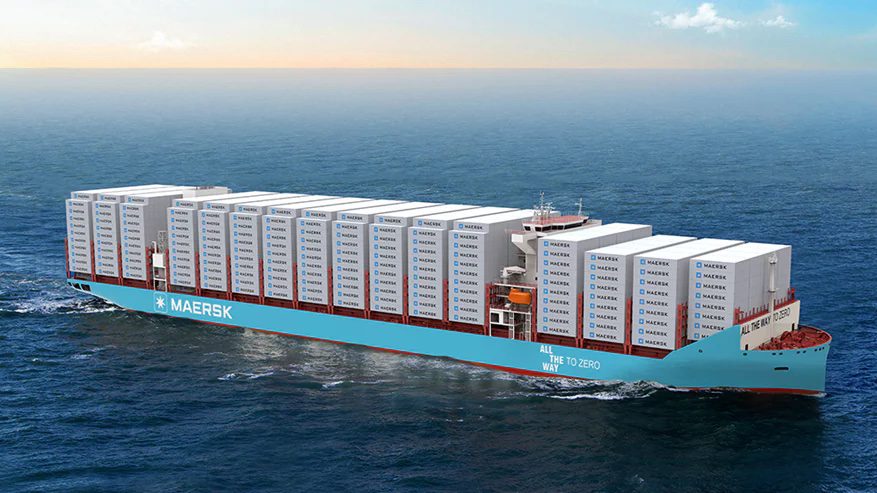Gunvor to Ship North Sea Crude to Asia After Bull Play Wraps Up
(Bloomberg) — Gunvor Group will send a supertanker loaded with North Sea Forties crude to Asia after the trading house amassed a large volume of benchmark oil in a month-long...


Illustration by Maric design courtesy of Maersk
A.P. Moller – Maersk (Maersk) has announced an additional order for six mid-sized containerships equipped dual-fuel engines capable of operating on carbon neutral green methanol. The order brings Maersk’s methanol-powered orderbook to 25 containerships.
The six vessels will be built at Yangzijiang Shipbuilding in China and will come with a capacity of 9,000 TEUs. Deliveries are planned in 2026 and 2027.
“With this order, we take another step in the green transformation of our fleet and towards our target of becoming net-zero in 2040. As with all our other vessel orders for the last two years, these ships will be able to run on green methanol,” said Rabab Boulos, Chief Infrastructure Officer at Maersk.
The six vessels will replace existing capacity in Maersk’s fleet and reduce annual greenhouse gas emissions by about 450,000 tons CO2e per year on a fuel lifecycle basis when operating on green methanol, according to the company.
In 2021, Maersk ordered the world’s first methanol-powered containership following a decision to only ordering newbuild vessels that can sail on green fuels. The feeder vessel has a capacity of 2,100 TEUs, and is currently being constructed at Hyundai Mipo Dockyard in South Korea. Delivery is planned for later this year.
Maersk has ordered 18 green methanol-powered ships from Hyundai Heavy Industries, with eight 16,000 TEU ships ordered in August 2021 and four additional sister ships later exercised, followed by an order for six 17,000 TEU ships in November 2022. The ships are scheduled for delivery in 2024 and 2025.
Just two years after that first methanol-powered ship order, the global orderbook now stands at more than 100 methanol-enabled vessels, according to Maersk.
“For these six container vessels, we have chosen a design and vessel size which make them very flexible from a deployment point of view,” Boulos said. “This will allow these vessels to fill many functions in both our current and our future network, thereby offering the flexibility our customers demand. Once phased in, they will replace existing capacity in our fleet.”
Join the gCaptain Club for curated content, insider opinions, and vibrant community discussions.


Join the 107,104 members that receive our newsletter.
Have a news tip? Let us know.
Access exclusive insights, engage in vibrant discussions, and gain perspectives from our CEO.
Sign Up




Maritime and offshore news trusted by our 107,104 members delivered daily straight to your inbox.



Essential news coupled with the finest maritime content sourced from across the globe.
Sign Up